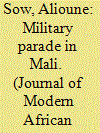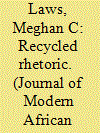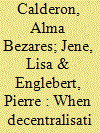|
|
|
Sort Order |
|
|
|
Items / Page
|
|
|
|
|
|
|
| Srl | Item |
| 1 |
ID:
179298


|
|
|
|
|
| Summary/Abstract |
In Togo, the opposition movement behind the anti-government protests that broke out in 2017–2018 appears to reflect a greater role for Islam in politics. Tikpi Atchadam, leader of the Parti National Panafricain, was the preeminent figure in the movement, having built a solid grassroots base among his fellow Muslims. This article examines the unique role that Muslim leaders played in these protests, as well as the Faure Gnassingbé regime's strategic response. The ruling party made spurious claims against Muslim opponents, associating them with a dangerous wave of political Islam. I argue that by portraying Atchadam as the leader of a radical ethnic and religious movement with Islamist goals, Faure Gnassingbé and his supporters sought to weaken this emerging challenger and deter members of the public from backing calls for political change. The strategy also helped garner support from Western countries while simultaneously driving a wedge between Muslim community leaders.
|
|
|
|
|
|
|
|
|
|
|
|
|
|
|
|
| 2 |
ID:
179296


|
|
|
|
|
| Summary/Abstract |
Many scholars argue that the media can influence policymakers – determining the policy agenda, framing issues, prioritising issues and, on occasion, setting the policy as well. It could be, however, that skilled policymakers exploit the media, so that the media in fact reflects the issues that policymakers want debated. This then poses an important question of whether the media does indeed influence the public policy process. The topic of media influence is widely studied in consolidated democracies but there has been limited research in consolidating democracies. This paper addresses both of these gaps – through exploring the extent to which the media influences policymakers in Kenya, a country perceived to have a moderately free press and one in which a range of interest groups vie to influence government and thus with a media likely to carry a range of competing opinions.
|
|
|
|
|
|
|
|
|
|
|
|
|
|
|
|
| 3 |
ID:
179299


|
|
|
|
|
| Summary/Abstract |
This essay argues that the Independence Day's military parade in Mali has become a strategic site to negotiate fragile military and civil relations, and a repository to promote social change through the military experience. Drawing on field observations of the parade of the 50th anniversary of Independence in Bamako and the literature on political transitions, this essay demonstrates that military parades constitute meaningful sites for alternative engagements with democratic transitions. It examines the tactics and mechanisms deployed by the Malian national army to negotiate past human rights violations and authoritarian practices, as well as to seek the army's rehabilitation following the collapse of the military regime. By analysing military parades as a form and practice consolidating the ‘social contract’ between the army and the public after the political transition, this article contributes to the scholarship on transition and the study of military parades within the African continent.
|
|
|
|
|
|
|
|
|
|
|
|
|
|
|
|
| 4 |
ID:
179297


|
|
|
|
|
| Summary/Abstract |
Seen as one of Africa's most visionary and enlightened autocrats, Paul Kagame's presidency is often contrasted with the violence and ethnocentrism of his discredited predecessors. Drawing on rarely analysed primary sources, this article disputes this simplified narrative by revealing striking continuities in the ruling elite's rhetorical repertoire in the late colonial period (1956–1959) and present-day Rwanda. Both then and now, rhetorical calls to remove ethnic labels from public discourse in the name of national unity are key resilience strategies designed to shape regime relations with domestic and international audiences in ways that reinforce power concentration by a small (largely Tutsi) elite. Changes in the distribution of power and the scale of anti-Tutsi violence (most notably in 1994) help explain why a similar rhetorical strategy failed to prevent the dismantling of the Tutsi oligarchy in 1961 while strengthening its contemporary counterpart.
|
|
|
|
|
|
|
|
|
|
|
|
|
|
|
|
| 5 |
ID:
179295


|
|
|
|
|
| Summary/Abstract |
African regimes commonly use strategies of balanced ethnic representation to build support. Decentralisation reforms, often promoted in order to improve political representation and state access, can undermine such strategies. In this article we use the example of the DR Congo to show the extent to which the multiplication of decentralised provinces is upending a political system largely based until now upon collective ethnic representation in the state. Not only are Congo's new provinces more ethnically homogeneous than their predecessors, but many of them have also witnessed political takeover and monopolisation by the province's dominant ethnic group. In addition, the increased number of Congolese who now find themselves non-autochthonous to their province of residence heightens their vulnerability and the potential for local conflict. Decentralisation, whose intent was proximity to governance, might well end up excluding more Congolese from the benefits of political representation. The article uses original empirical evidence on provincial ethnic distributions to support its claims.
|
|
|
|
|
|
|
|
|
|
|
|
|
|
|
|
|
|
|
|
|